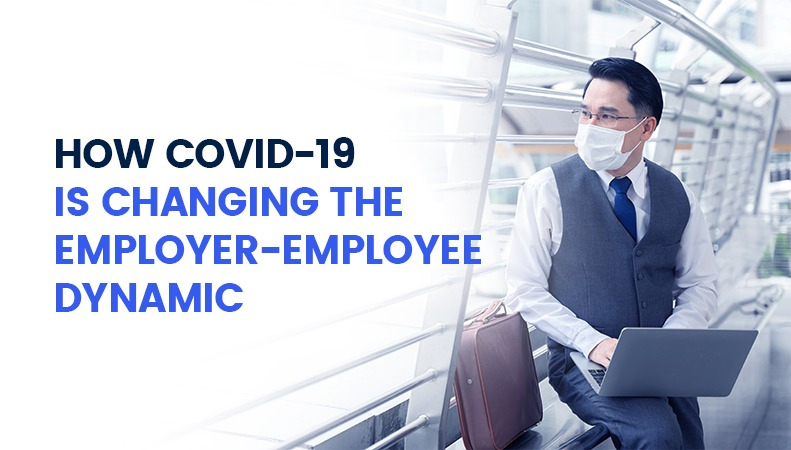
HOW COVID-19 IS CHANGING THE EMPLOYER-EMPLOYEE DYNAMIC
29th July 2021
The global COVID-19 pandemic has had a wide-ranging effect. Leaders must now think of long-term viability. Before COVID-19, the organizational decisions that must be made would have a huge effect on those involved in the finance and insurance sectors. Maintaining the highest level of customer service, especially when working with customers who are frustrated or are in financial difficulties, can be detrimental to an employees' well-being.
Similarly, removing the concept of a "physical workplace," such as bank branches, may raise concerns about how justice and equality are treated. HR must serve as a strategic partner in such situations. The role of this job should be in charge of long-term planning to remain ahead of the problem and adapt to changes.
For example, in Malaysia, the emerging trends of a global e-wallet for remote workers is just one example of how fintech in Malaysia will have to grow due to the pandemic.
The Coronavirus outbreak has altered the workplace in ways we could never have predicted. The systems we use have changed significantly in the last few months, from team meetings to employee performance reviews. With remote working being the new normal, it is understandable that many workers can struggle to adapt to the new realities of the workplace. As a result of these changes, many workers feel stress, anxiety and a lack of motivation.
Research on the effects of working from home have often pointed out that making people work from home with their children, in unsuitable spaces, with little or no options, and no in-office days, result in productivity disasters for companies. He goes on to say that a lack of face-to-face cooperation could lead to a decline in innovation. It is not all bad though, as companies around the world are forced to adapt and adopt innovative solutions that deal with tough working situations and inefficient organizational practices, which leads to growth in some shape or form.
Here are a few tips for employers dealing with changes which was brought about by the pandemic that might help steer your company’s direction towards a more optimistic outlook.
1. Commit to guiding principles on employees’ well-being
This would be part of a larger reorganization of the business model. Putting health and safety first, extending treatment more generally, maintaining absolute accountability, and balancing consistency with equity should all be guiding principles for banks and employees.
2. Be Kind
The hope that college seniors felt at the start of the year is waning as unemployment rates grow and more businesses struggle. According to the report, the graduating class of 2020 planned to apply to an average of 10 jobs before the lockdown, but that amount increased to 20. During this time, Lucas believed that workers should show kindness and empathy to their employees. “Exhibit compassion for the class of 2020 as they adjust to their new life. Many companies have discovered a way to accept remote work, and we must do the same with virtual recruitment and hiring. Take the time now to put in place the right tactics and innovations, because how you handle applicants and welcome potential hires into the workforce will have a long-term effect on them and your company's bottom line.
3. Innovation in employee engagement, upskill and team building
Employee morale may be negatively affected by staying away from the workplace atmosphere or by a lack of social interaction with co-workers. This is where HR representatives, supervisors, and team leaders come up with enjoyable activities to keep workers engaged. Employees will participate in a variety of events, including sports, exercise classes, one-on-one conversations with founders, virtual family day, and many others. Companies may assist workers in enrolling in online courses for upskilling in addition to virtual activities.
4. When in unknown territory, map it out first
It's more relevant than it seems to be to map out various processes and customer journeys. While operational problems can seem insignificant, they have a significant effect on a company's overall productivity and performance. According to research, when an organization is ready to scale, it must abandon its existing structures, procedures, policies, and practices. That is because what got the business to this point will not get it any further.
“The ‘scaling' stage starts once a business has demonstrated certain main aspects (e.g., technology, consumers, pricing) of its value proposition and must now expand in parallel to its demand alongside its development and distribution capabilities,” write MIT-ASB Professors Charles Fine and Loredana Padurean.
5. Not just professional growth, but personal growth too
If there was ever a time to focus on the personal development of your employees, it is now. Employers should look into these aspects as much as they do with professional growth of team members within a company, because of the shift in working environments and its impact on the very fabric of workforce culture in general. People are working from home, organizations are forced to consider adding more flexibility into their structures and routines and workers are relying now on leaders for more professional and emotional support.
Do not forget to check up on all your teammates and start treating them as human beings with desires and dreams to grow and excel in more ways than one. Communication is key from this point on, and the companies that support their people on a personal as well as professional level are bound to succeed.
6. Innovation in processes
Rethink the company's processes and hierarchies. The days of several layers of managers approving a single decision are long gone. Empower smaller teams to make decisions more efficiently. Avoid micromanaging the staff and instead, give them the freedom to make their own decisions. Limit the number of people in video calls/meetings and avoid any unproductive or unwanted meetings that might slow down the team. Focus on efficiency by identifying and removing redundant, time-consuming procedures because this will make room for innovative solutions that will fine-tune your company processes.
The employer-employee dynamic is at stake now more than ever, and every little detail must be accounted for in order to survive and thrive in these tough times. This means that interaction points must be focused on, including aspects like employee management and salary management as well as human resource and impeccable communications between different departments. EVOLET is an innovative salary management system which hones down on the many aspects of financial accessibility and processes.
Features are designed to help mend the relationship between employer and employee through an effective payroll component that optimizes the structure in which companies issue payments to their people. This minimizes errors, enhances efficiency and ensures speed as well as convenience, which in turn leads to better employee satisfaction. What's more, financial accessibility is included for the unbanked and migrant workers or lower-income groups, so nobody gets left out of the financial tech revolution.
Learn more at https://evolet.io/
